From Jugaad to Juggernaut: India's Leap in Frugal Tech
- Arsh Sharma
- Aug 4, 2025
- 6 min read
Introduction: The Art of Doing More with Less
In the bustling streets of Mumbai, a mechanic fashions a TV antenna from coat hangers to improve reception. In Bangalore, engineers develop a handheld ECG machine that costs a fraction of Western alternatives while delivering world-class healthcare. Welcome to the world of jugaad – India's indigenous philosophy of frugal innovation that has evolved from makeshift solutions to a global business paradigm.
The term "jugaad," derived from Hindi, literally means an improvised solution using scarce resources. What began as necessity-driven improvisation has transformed into a sophisticated innovation methodology that is reshaping industries worldwide. From the world's cheapest car to Mars missions costing less than Hollywood movies, India's frugal tech revolution demonstrates that constraints, rather than limiting creativity, can unleash it.
Understanding the Mindset: The Philosophy of Frugal Innovation
Frugal innovation represents a fundamental shift from the traditional Western approach of "more is better" to "good enough is often perfect". This mindset encompasses three core principles:
Affordable Excellence: Creating high-quality solutions at dramatically reduced costs.
Robustness: Designing products that withstand infrastructural challenges like power cuts, voltage fluctuations, and extreme weather.
User-Centricity: Developing solutions that genuinely address the needs of underserved populations.
The COVID-19 pandemic demonstrated jugaad's relevance globally, as resource-constrained environments worldwide required creative solutions. Indian companies and innovators quickly pivoted to produce face shields, ventilators, and testing equipment using minimal resources – embodying the jugaad spirit for the greater good.

Iconic Examples of Indian Frugal Innovation
1. Mangalyaan: Space on a Shoestring Budget
Perhaps no example better illustrates India's frugal innovation capabilities than the Mars Orbiter Mission (Mangalyaan). Launched in 2014, this mission made India the first nation to reach Mars' orbit on its maiden attempt – and at an unprecedented cost. Cost comparison between India's Mars Orbiter Mission and NASA's MAVEN mission, demonstrating frugal engineering principles. The mission cost just $74 million, compared to NASA's MAVEN mission which cost $671 million – nearly ten times more.

As Prime Minister Narendra Modi famously quipped, India's Mars mission cost less than the Hollywood movie "Gravity". This achievement wasn't just about cost-cutting; it represented a triumph of frugal engineering principles:
Miniaturization: The spacecraft was approximately the size of a Tata Nano car
Resource Optimization: Scientists wore plastic shower caps instead of expensive cleanroom gear
Innovative Design: Only one physical model was built, with extensive software testing replacing multiple prototypes

As Prime Minister Narendra Modi famously quipped, India's Mars mission cost less than the Hollywood movie "Gravity". This achievement wasn't just about cost-cutting; it represented a triumph of frugal engineering principles:
Miniaturization: The spacecraft was approximately the size of a Tata Nano car
Resource Optimization: Scientists wore plastic shower caps instead of expensive cleanroom gear
Innovative Design: Only one physical model was built, with extensive software testing replacing multiple prototypes
2. Tata Nano: The People's Car
The Tata Nano, launched in 2008 with a price tag of $2,000, exemplified frugal innovation in the automotive sector. While the car faced market challenges, its development showcased remarkable engineering ingenuity:
Modular Design: The car was designed to be sold in kits and assembled by local entrepreneurs
Strategic Partnerships: Global suppliers contributed proprietary technology while sharing development costs
Feature Optimization: Non-essential features were eliminated without compromising core functionality
The Nano's development involved over 500 engineers and resulted in 34 patents, demonstrating that frugal doesn't mean compromising on innovation.

3. Healthcare Innovations
Indian frugal innovation has revolutionized healthcare accessibility:
GE's MAC 400 ECG: Developed in India, this handheld electrocardiogram machine costs significantly less than traditional alternatives while maintaining diagnostic accuracy
Jaipur Foot: At just $1,300, this prosthetic limb costs 95% less than comparable Western alternatives while offering superior functionality for Indian conditions
ChotuKool Refrigerator: Godrej's thermoelectric cooling system operates on batteries and costs under $70, making refrigeration accessible to rural populations

The Scale of India's Tech Revolution
Growth Metrics
India's transformation from a jugaad-based informal economy to a global tech powerhouse is reflected in compelling statistics:
Over 157,000 startups registered as of 2024, making India the world's third-largest startup ecosystem.
118 unicorns with a combined valuation exceeding $385 billion.
$254 billion tech industry valuation in FY24, growing at 3.8% annually.
5.43 million IT professionals contributing 28% of the global STEM talent pool.
1.3 million jobs created by the startup ecosystem.
The ecosystem's maturity is evident in its diversity, with 48% of startups having at least one female director, and over 51% emerging from Tier II and Tier III cities.

Global Adoption and Recognition
Multinationals Embrace Frugal Innovation
Leading global companies are increasingly adopting frugal principles:
GE Healthcare has developed over 30 products in India for global markets, leveraging local frugal engineering capabilities.
Siemens launched 60 "SMART" products globally, developed using Indian frugal innovation methodologies.
Renault-Nissan, PepsiCo, and Philips have integrated frugal principles into their innovation strategies worldwide.
Academic and Corporate Interest
Top management institutes globally now offer courses on frugal innovation, studying Indian frugal methodologies. The concept has moved beyond cost-cutting to encompass sustainable development, resource efficiency, and inclusive growth.

Frugal Manufacturing: The Next Frontier
Smart Factories with Frugal DNA
Indian researchers are pioneering "Frugal Manufacturing" – applying jugaad principles to advanced manufacturing processes. Dr. Balkrishna C. Rao from IIT Madras has developed frameworks for sustainable, cost-effective manufacturing that maintains quality while minimizing resource consumption.
This approach has helped Indian manufacturers:
Reduce material wastage by 15% through better utilization
Develop low-cost alternatives to expensive imported machinery
Create manufacturing solutions suitable for resource-constrained environments
Industry 4.0 with Indian Characteristics
India's Industry 4.0 market, valued at $5.6 billion in 2024 and projected to reach $17.4 billion by 2033, embodies frugal innovation principles. Unlike Western implementations that focus on maximum automation, Indian approaches emphasize appropriate technology – using just enough digitization to achieve desired outcomes without over-engineering.

Challenges and Criticisms
The Quality Perception Challenge
Despite remarkable achievements, jugaad faces perception challenges. Dr. R.A. Mashelkar, former Director General of CSIR, cautioned against an over-emphasis on cost that might compromise India's innovation image globally. The challenge lies in balancing frugality with aspirational value.
Some critics argue that:
Jugaad solutions may lack the sophistication needed for global markets.
Focus on "good enough" might limit breakthrough innovations.
Patent protection remains weak for grassroots innovations.

Key Success Factors for Frugal Innovation
Understanding the Problem First
Successful jugaad innovators spend significant time understanding user problems before developing solutions. This user-centric approach ensures that innovations address real needs rather than perceived ones.
Ecosystem Collaboration
India's success stems from collaborative ecosystems involving:
Government support through initiatives like Startup India
Academic research institutions developing frugal methodologies
Private sector adoption and scaling
NGOs facilitating grassroots innovation
Cultural Acceptance of "Good Enough"
The willingness to accept "good enough" solutions allows for rapid iteration and improvement, contrasting with perfectionist approaches that may delay market entry.

Future Outlook: From Jugaad to Juggernaut
AI-Powered Frugal Innovation
The convergence of artificial intelligence with jugaad principles promises revolutionary changes. AI can identify community needs faster and develop cost-effective solutions with greater precision. IoT and AI are already proving to be valid predictors of frugal innovation success.
Deep Tech and Frugal Principles
India's deep-tech startup ecosystem, with over 3,600 ventures, increasingly applies frugal innovation principles to cutting-edge technologies like quantum computing and biotechnology. This combination promises solutions that are both technologically advanced and accessible.
Global Leadership in Sustainable Innovation
As climate change intensifies resource constraints globally, India's frugal innovation expertise becomes increasingly valuable. The country's experience in creating "appropriate technology" positions it to lead global sustainable development efforts.

Lessons for Global Innovation
Constraint as Catalyst
India's experience demonstrates that constraints can be powerful innovation catalysts. Resource limitations force creative problem-solving that often yields more elegant solutions than resource-abundant environments.
Bottom-Up Innovation
Unlike top-down R&D approaches, jugaad emphasizes bottom-up innovation that emerges from real-world problems. This approach ensures market relevance and user acceptance.
Speed and Agility
Jugaad's emphasis on rapid prototyping and iterative improvement enables faster time-to-market compared to traditional innovation cycles.

Conclusion: The Continuing Journey
India's journey from jugaad to tech juggernaut illustrates how indigenous innovation philosophies can evolve into global paradigms. The country's frugal innovation approach has not only transformed its domestic technology landscape but also influenced global innovation methodologies.
As India continues to grow its startup ecosystem – with projections of reaching a $300 billion IT industry by FY26 – the jugaad mindset remains relevant. The challenge now is to maintain this frugal innovation DNA while scaling to serve global markets and addressing complex challenges like climate change and sustainable development.
The story of Indian frugal tech is far from over. With increasing global recognition, supportive government policies, and a growing pool of talent, India is well-positioned to lead the next wave of sustainable, inclusive innovation. The jugaad philosophy – doing more with less – may well become the innovation imperative for a resource-constrained world seeking sustainable solutions.
From makeshift TV antennas to Mars missions, from village-level innovations to global unicorns, India's frugal tech revolution demonstrates that innovation knows no boundaries when driven by necessity, creativity, and the fundamental human desire to solve problems. The jugaad mindset – India's unique contribution to global innovation thinking – continues to evolve, promising a future where technology serves not just the affluent few, but the aspiring many.



Comments